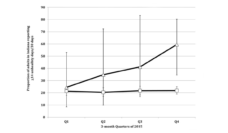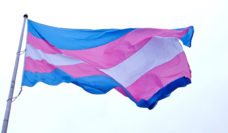In contemporary America, there has been much progress in garnering public support and legal rights for the lesbian, gay and bisexual (LGB)-identified community. For instance, two recent decisions from the U.S. Supreme Court (a 2015 ruling that legalized same-sex marriage and a 2020 ruling that strengthened workplace protections for LGB-identified individuals) have contributed to a decrease in discrimination against Americans due to their sexuality and gender identity. Nevertheless, multiple studies have demonstrated that, with respect to their straight counterparts, LGB individuals often report poorer mental and physical health outcomes. Furthermore, there are certain studies showing bisexual individuals suffering the worst outcomes across groups. According to minority stress theory, the discrimination that LGB people experience is a substantial contributor to these health-related disparities. Further studies have demonstrated that the timing of historical events which hold consequences for LGB individuals may lead to differing experiences of discrimination across LGB generations.
For our paper, we (Liu and Reczek (2021)) analyzed data from the National Health Interview Surveys that was collected via United States households from 2013-2018 by the National Center for Health Statistics (NCHS). This study tested two competing theories addressing generational trends in health disparities. First, given the social and legal advancements of the last few decades, the authors hypothesized that more recent LGB generations would report enduring less health-related challenges than their older counterparts when compared against heterosexuals. Second, since interpersonal and structural discrimination are still fixtures of modern society, it is also possible that recent LGB generations would report experiencing health-related challenges that are just as severe or perhaps even worse than older generations.
These findings suggest that negative health consequences among younger LGB generations have not diminished as a result of recent social change but have actually increased.
The study examined five health outcomes including self-rated physical health, activity limitation, psychological distress, depression, and anxiety. These outcomes were examined with respect to three birth cohorts: Baby Boomers and pre-Boomers, Generation Xers, and Millennials. They found widening gaps in both mental and physical health between LGB individuals and straight individuals across generations, with bisexual individuals experiencing the largest increasing disparity. These findings suggest that negative health consequences among younger LGB generations have not diminished as a result of recent social change but have actually increased. Moreover, across generations, the results show that 1) bisexuals reported the worst health outcomes of all sexual minority groups, and 2) bisexuals also experienced the most remarkable widening trends of health disparities relative to their straight peers.
There are several viable explanations for the findings. For example, it’s conceivable that older LGB generations have gained the ability to cope with life’s challenges with age, while their younger LGB counterparts are still developing such skills, thereby creating greater health challenges for the latter generation. Additionally, today younger LGB generations enjoy greater legal protections and social acceptance than older generations did during their formative years, hence modern forms of anti-LGB discrimination (e.g., subtle prejudice) may create greater distress for younger generations of LGB individuals than their older counterparts. Moreover, where it pertains to the finding that bisexual individuals experience worse health outcomes than other sexual minority groups, this may be explained by the “double stigma” bisexuals face from both the straight and the gay/lesbian communities.
Some scholars predict that increasing legal rights and social acceptance of LGB groups will decrease stigma and as a result reduce health-related hindrances, however the data urge cautious optimism. Recent legal boons and increasing public acceptance have yet to result in more positive health consequences for the LGB community, even in the most recent generations. Hence, more drastic interpersonal and institutional changes must occur before LGB individuals’ discrimination-related suffering can be reduced and thus translate to better health outcomes.
Photo via Getty Images
















